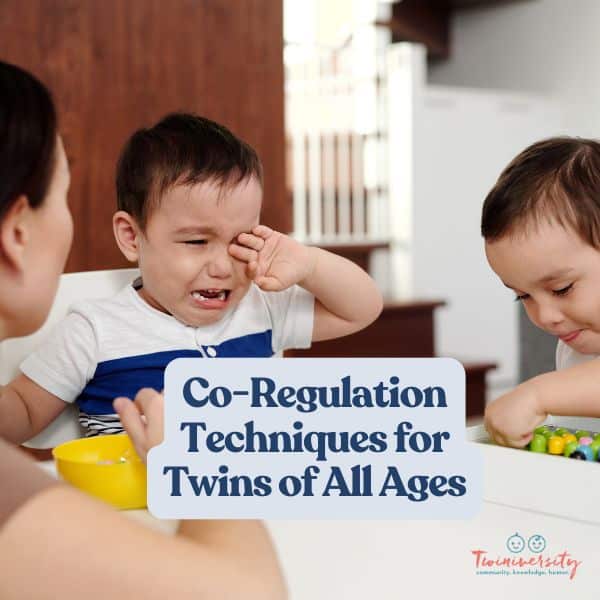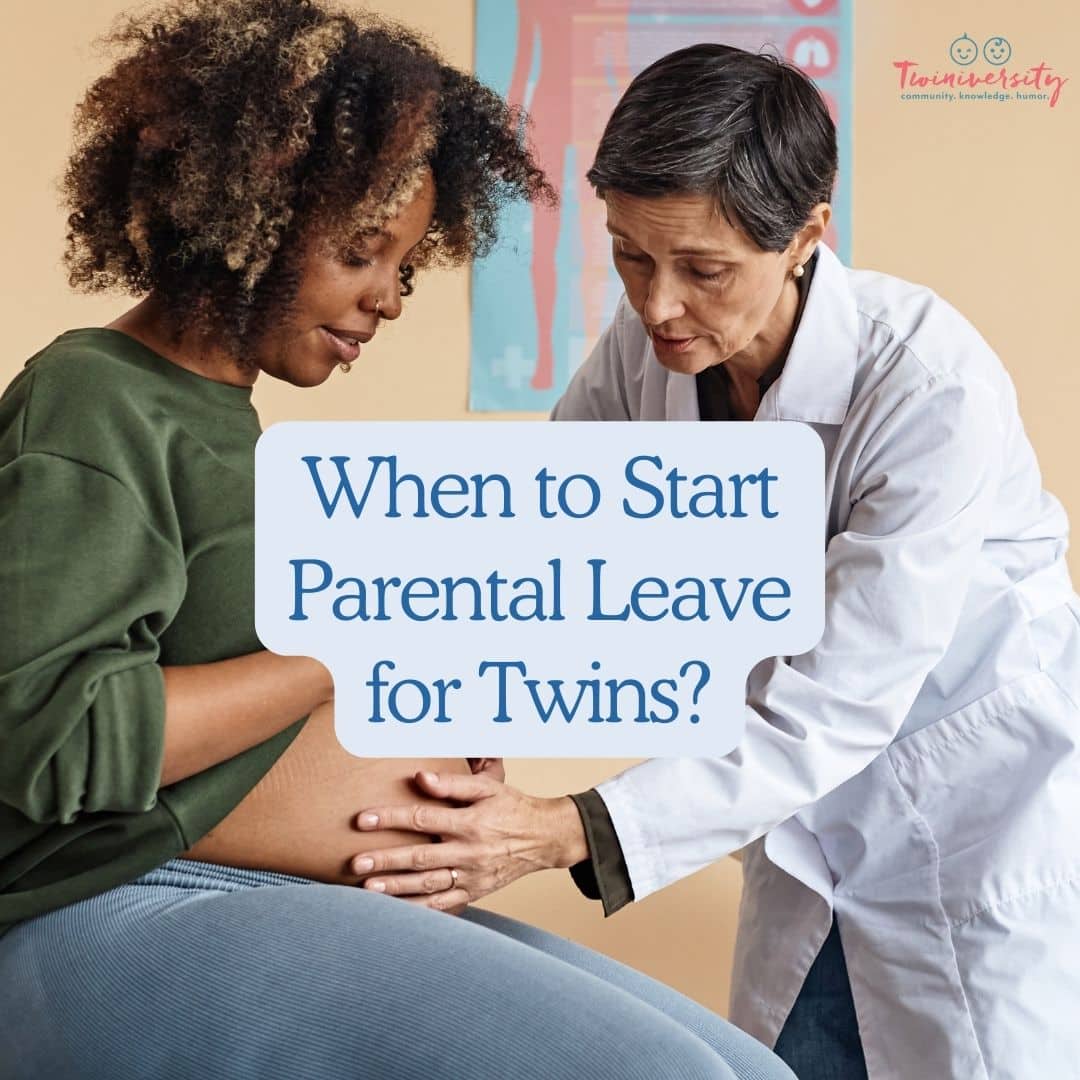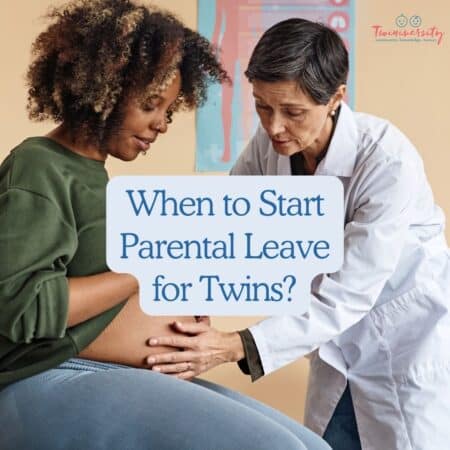Last updated on July 30th, 2024 at 02:25 pm
Finding out you are expecting twins can bring about dozens of questions. Here are the top 4 questions to ask your doctor early on in your twin pregnancy!
Congratulations! You just found out that you are pregnant with twins! Now what? You may be feeling a mix of emotions: shock, happiness, anxiety, excitement, or maybe fear. Not to mention the one million questions that are running through your head all at once. Take a deep breath, and start with these four questions to ask your doctor.
Disclaimer: All content on this website, including medical opinions and any other health-related information, is for informational purposes only and should not be considered to be a specific diagnosis or treatment plan for any individual situation. Use of this site and the information contained herein does not create a doctor-patient relationship. Always seek the direct advice of your own doctor in connection with any questions or issues you may have regarding your own health or the health of others.

1. Ask Your Doctor What Type of Twins You’re Having
This is the first question you will want to ask your doctor during your first appointment. There are three types of twin pregnancies, and each one has different levels of risk. Most twin pregnancies are automatically considered high risk (don’t let that scare you), but some are riskier than others.
The three types of twins are:
- Dichorionic/Diamniotic (di/di) come from two eggs and two sperm resulting in two placentas and two amniotic sacs. Di/di is the lowest risk of twin pregnancies and is often treated no different from a singleton pregnancy for the first two trimesters.
- Monochorionic/Diamniotic (mono/di) come from one sperm and one egg which splits between days 3 and 7 after conception resulting in one placenta and two amniotic sacs. Mono/di is riskier than di/di because of the possibility of identical twin-specific complications, such as twin-to-twin transfusion syndrome (TTTS) and selective Intra-Uterine Growth Restriction (sIUGR).
- Monochorionic/Monoamniotic (mono/mono) come from one sperm and one egg which splits more than a week after conception resulting in one placenta and one amniotic sac. Mono/mono twin pregnancy, while rare, is very high risk. Since the twins share a placenta as well as an amniotic sac, there is the potential for all of the issues that come with mono/di like TTTS, as well as other serious problems like cord entanglement. As such, mono/mono pregnancies are very closely monitored and typically require a hospital stay and early induction.
Due to the increased risks of identical twin pregnancy, it’s critical that you ask your doctor what type of twins you’re carrying early in your pregnancy. If your doctor does not believe that identical twins require any extra care, consider finding a new one or seek the advice of a Maternal Fetal Monitoring specialist.
Twiniversity Tip: Many doctors believe that all di/di twins are fraternal (dizygotic). This is a common misconception. Di/di twins can be identical (monozygotic). In fact, about 30% of di/di twins are actually monozygotic pregnancies. This occurs when the egg splits very early after fertilization, usually within the first 3 days causing each embryo to have its own sac and placenta. This pregnancy will be treated as di/di it lacks the risks of a shared placenta. Unless they are boy/girl twins, only a DNA zygosity test after birth can confirm whether they are identical or fraternal.
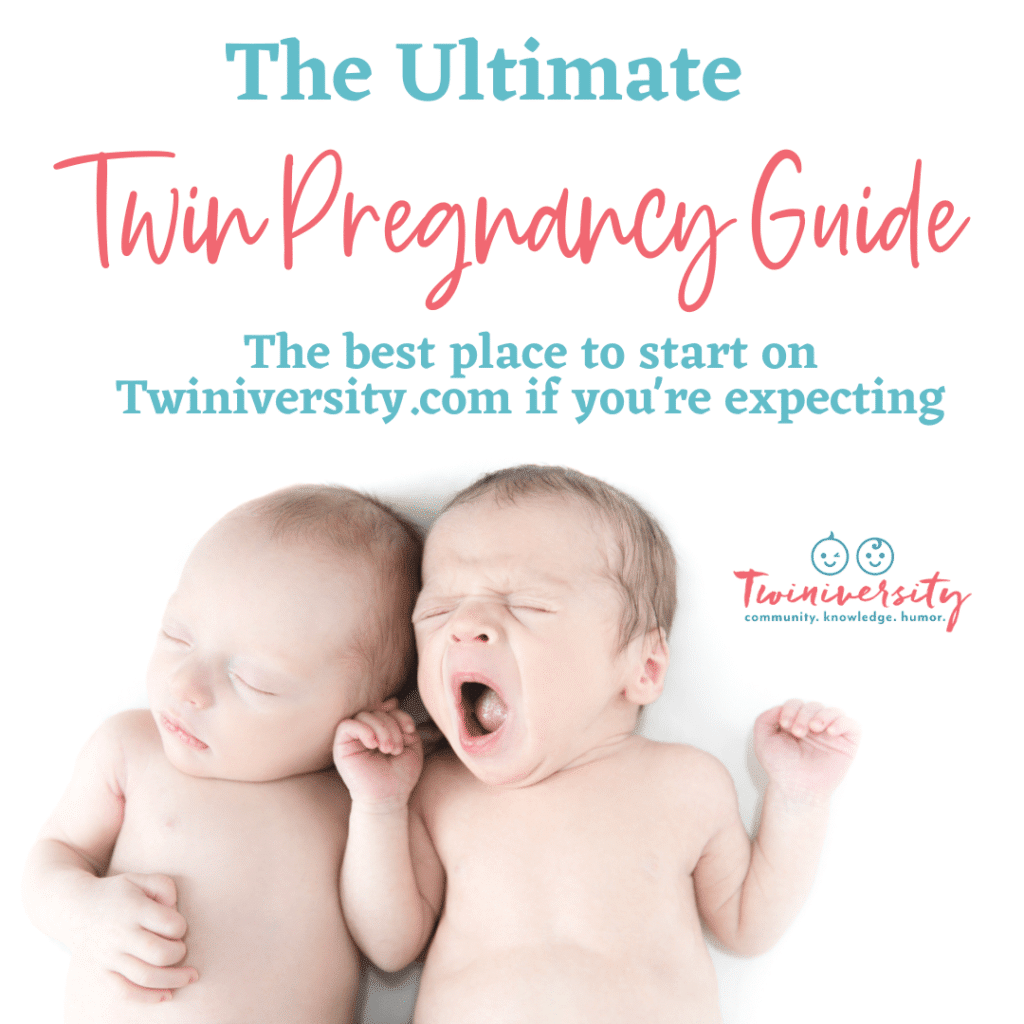
Pregnant with twins and not sure where to start? Visit the Ultimate Twin Pregnancy Guide to find all the top articles and resources to get you ready for twins. While you’re at it, check out our expecting twin classes and Twiniversity shop!
2. Ask Your Doctor How Your Twin Pregnancy Might Be Different From a Singleton Pregnancy
Aside from a bigger bump and double the baby gear, a twin pregnancy is often different from a singleton pregnancy in a few ways.
One thing you can count on is more monitoring through doctor’s appointments and ultrasounds. How much monitoring depends on the type of twins you’re having as well as other factors such as your age, overall health, and previous pregnancies. The babies’ growth and overall health will also be monitored closely. Ask your doctor how often to expect ultrasound scans.
Twin pregnancies carry an increased risk of complications such as gestational diabetes, preeclampsia, and preterm labor so you will be monitored more closely, especially leading up to delivery day. You will likely have extra lab work, and a few different types of tests including prenatal genetic testing, non-stress tests (NSTs), biophysical profiles (BPPs). Ask your doctor what types of tests and monitoring tools they will use to keep an eye on you and your little ones.
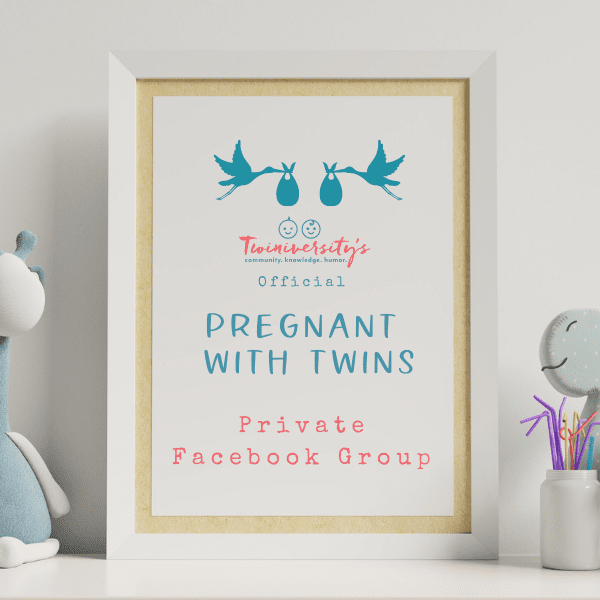
Did you know we have a FREE Facebook group just for expecting twin parents? Hurry and join today to find support from expecting twin mamas who get it!
3. Ask Your Doctor if You Will Need to See a Specialist
For identical (mono/di or mono/mono) twins, seeing a specialist is a must. You will most likely see a Maternal Fetal Medicine (MFM) specialist in addition to your OB-GYN. The MFM will be responsible for many, if not all, of your growth ultrasounds and will be watching your twins very closely for complications like TTTS. One way to think of an MFM is as your babies’ doctor, while your OB-GYN is your doctor. MFMs are highly trained and specialize in high-risk pregnancies.
If you have di/di twins, whether you see an MFM is up to you and your OB. I did not see an MFM during my di/di pregnancy, but my OB’s office was also very experienced with twins and they had good ultrasound equipment for growth ultrasounds as well as everything needed for NSTs. If your OB practice is small or is not experienced with twin pregnancies, you may want to see an MFM, even for a di/di pregnancy. Ask your doctor for a referral.

4. Ask Your Doctor How Having Twins Might Affect Your Delivery Day and Afterward
Be sure to ask your doctor about your options for delivery day early in your pregnancy. You may have preferred choices for delivery but often your doctor will encourage you to follow their recommendations. While most twin deliveries are completely fine, it’s important to be prepared for anything that can occur. Be sure to ask your doctor their preferences and recommendations. Here a few ways delivery day might look different in a twin pregnancy and what to ask your doctor to prepare.
Vaginal Delivery vs. C-Section
Vaginally delivery is absolutely an option for twins. That said, the chances of complications are higher and therefore the risk of a c-section is increased. As such, many doctors have requirements for delivering vaginally. Ask your doctor early on about their preferences and recommendations for delivery.
One factor that will influence how you deliver is the babies’ positions. Most doctors will avoid vaginal birth of breech babies and require that both be head down. Some doctors require that only the first baby (baby A) be head down. Others are comfortable delivering baby B breech. Ask your doctor about their experience delivering twins and what they are comfortable with.
Regardless of what you and your doctor plan, prepare yourself for the possibility of a c-section. Be sure to ask your doctor about their experience with double-whammy delivery as well. This is when baby A is born vaginally, while baby B requires an emergency c-section. In this case, ask your doctor about the hospital where you will deliver and who will perform the surgery.

Timing of Delivery
Not only are twins at higher risk for preterm labor and premature birth, but doctors typically recommend early delivery due to increased risks of complications. For uncomplicated di/di twins it’s usually by 38-39 weeks. Most mono/di twins are born between 35 and 37 weeks, while mono/mono are even earlier.
NICU Time
The majority of premature births require a NICU stay, even if only for observation after birth. Be sure to ask your doctor about their hospital privileges. Ideally, you will want a hospital with at least a Level III NICU. You can also ask your doctor what to expect from the NICU and how you can prepare ahead of time.

Worried about breastfeeding twins? What To Do When You’re Breastfeeding Two is an on-demand online breastfeeding twins class made just for YOU! This course was created by Twiniversity in partnership with Judy Teibloom-Mishkin, IBCLC. Click here to learn more…

Ask Your Doctor These 4 Questions for a Great Start to Twin Pregnancy
Expecting twins can be both wonderful and scary. Your doctor can help by providing education, support, and resources. Now that you know the most important questions to ask your doctor, take a deep breath and focus on a healthy pregnancy. Chances are everything will be fine, and in just a few months you will be holding your sweet little twins in your arms.

Sarah Morel has been married to her wonderful husband for six years, and is a stay at home mom to four kids under five, including infant twins. She spends most of her days chasing her boys around, feeding babies, or struggling to keep the house clean. In her limited spare time, she enjoys spending time with family and friends, reading Harry Potter and young adult fantasy, chatting with other parents on internet forums, and writing. You can find out more about her on her blog.
Latest Twiniversity Articles
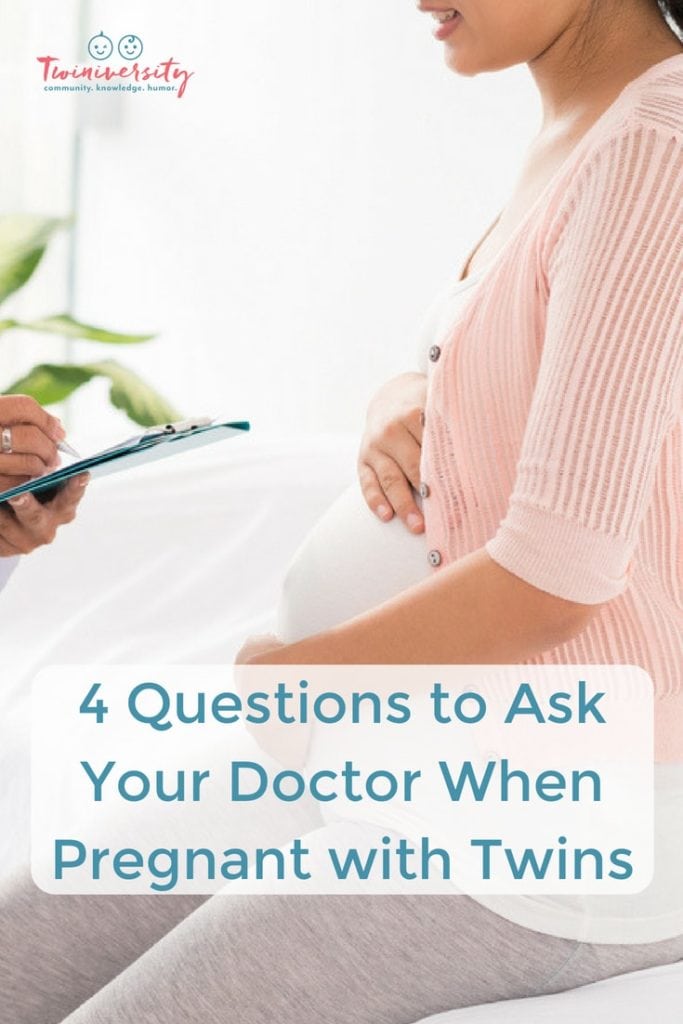
Are You a New Twin Parent?
Check out Natalie Diaz’s book:
“What To Do When You’re Having Two
The Twin Survival Guide From Pregnancy Through the First Year”
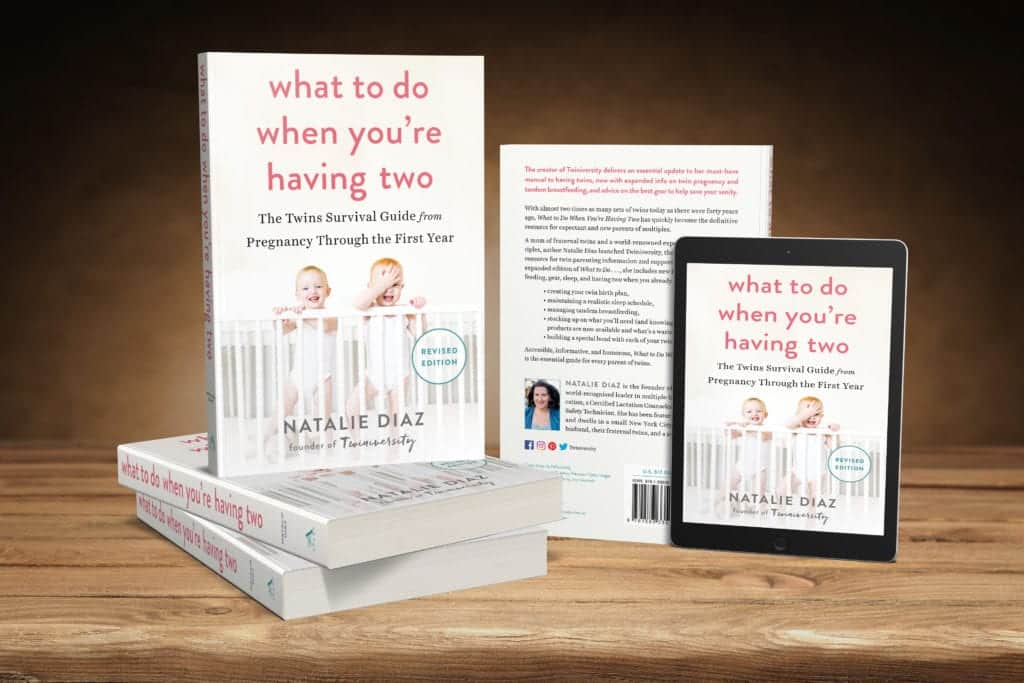
In What to Do When You’re Having Two: The Twins Survival Guide from Pregnancy Through the First Year, national twins guru and founder of Twiniversity (and twin mom herself!) Natalie Diaz provides a no-holds-barred resource about life with twins, from pregnancy and birth all the way through your duo’s first year of life.
Accessible and informative, What to Do When You’re Having Two
is the must-have manual for all parents of twins.

Got twins? Us too! The Twiniversity Podcast with Natalie Diaz was created BY parents of twins FOR parents of twins, from your pregnancy days through your twin’s teenage years, this podcast covers it all. It’s all about parenting twins, offering plenty of strategies for making life better, parenting hacks, and, of course, humor. We are laughing WITH you every step of the way.



